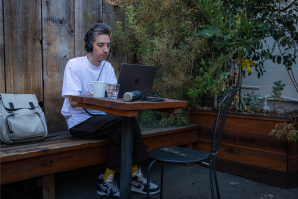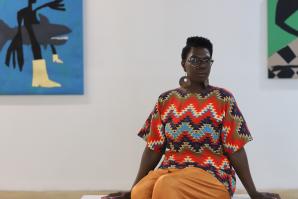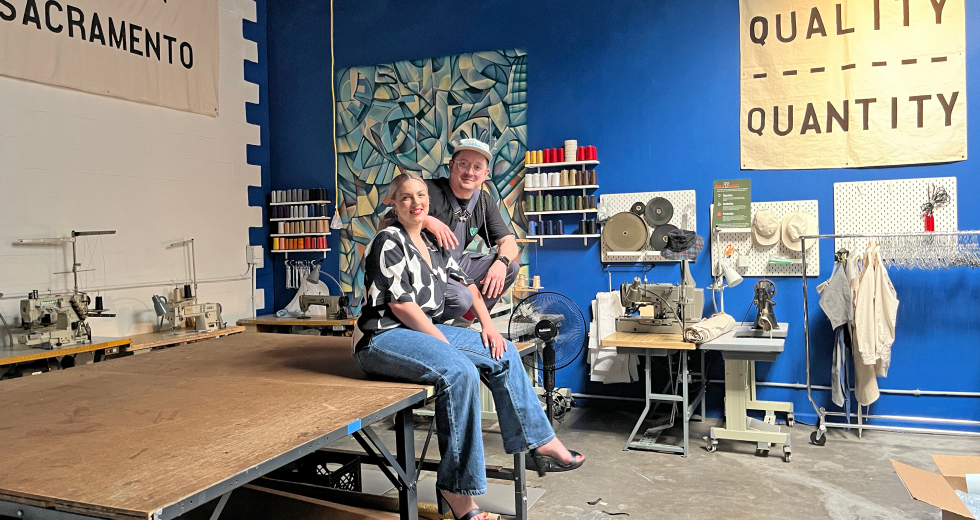In their brightly lit, smartly appointed shop in Midtown, Topstitch owners Mallory Maupin and Samuel Rose teach workshops, fulfill custom orders, consult on product development and work on their own projects. If you need anything from restaurant napkins to an athletic shoe prototype, Topstitch can make it or teach you how to make it.
Maupin inherited her love of wearable art from her grandma, who was a model, and her mom, who was also enamored with clothes. She attended the Academy of Art University in San Francisco, where she majored in fashion merchandising and switched to fashion marketing when she discovered she had a knack for it. In addition to being the chief operating officer of Topstitch, she works for a firm as an account executive.
Topstitch CEO Rose grew up in Colorado and then Sacramento. He always paid close attention to fashion as an expression of subculture, whether it was skating, hip-hop or punk. His senior year in high school, he completed a screen-printing internship in Galt with a professional printer. From that point on, he was completely hooked.
Rose studied fashion design after high school and took a life-changing trip to New York City to tour the garment district. His first job was at a military-style brand in San Francisco, where he learned to construct out of heavy materials, how to price, how to scale — all the logistics involved in getting a product to market.
The couple met on the corner of Market and Montgomery in San Francisco while Maupin was still in school and Rose was making hunting jackets. Their mutual love of clothing, design and culture drew them together. “It’s a form of artistic expression, and I think it’s really powerful because it’s something you carry with you each day. It’s the way you present yourself to the world,” Maupin says.
Flash forward to the present, and their shared vision of starting a fashion industry in Sacramento has become a reality with Topstitch. It’s not enough for this team to build their own brand: They want to activate an entire workforce of fashion designers.
On building community through fun and education:
Maupin: We provide community-based workshops like sip and sew; kind of entertainment-based, social experiences where you’re learning a new skill.
Rose: We’re working with Sol Collective, and we put together a 10-week course for Native youth with the basics of sewing but also photography, marketing, screen printing — how to build and sell a brand. So we provide the basics, and then they work with the elders who will teach them traditional finish work.
Maupin: So, trying to build skills and inter-generational knowledge that they can bring back into their communities.
How they are incubating unique style and developing a fashion industry in Sacramento:
Maupin: If you look at our community colleges and Sac State, they have really strong fashion programs, and for those students, there’s nowhere for them to apply their technical skills. There’s no roadmap.
Rose: Every single one of our talented people is told they have to go somewhere else to succeed. But if we can give you a job when you’re coming up, you get to sharpen your skills and collect a paycheck. You’re growing so much every day … and when you’re ready to start your brand, we can help with that.
It’s very important for there to be a fashion industry here. There’s the designing and building of each piece and the appreciation from the general public for high-quality, unique clothing. And if we can get both of those things in Sacramento, we can become a hub and start influencing places like Los Angeles or New York — we can have our own ecosystem and our own style too.
Maupin:We do product development, so let’s say you’re a yoga studio and you want to start an athleisure line. You have some ideas but you don’t know how to do it. We’ll help you figure out the technical pieces with prototyping, testing, building product samples, and really get it ready to go into production. And you’d have the option to produce with us.
We want to give local businesses the chance to manufacture close by: high quality with ethical standards. We specialize in soft goods, anything you can make with textiles. We’d like to work with farm-to-fork restaurants and hospitality. We want them to come to us because they see the value in it.
Rose:It’s also about trying to keep the money in Sacramento. There’s no way you can get 45 chef coats made here. … So for example, I’d love to bring more streetwear into the restaurants, like super-cool chef coats that really stand out — really functional and signature Sacramento.
On fast fashion and solving the problem of waste:
Maupin:We want to support smaller brands and companies in a sustainable way, so we have low minimums. When you manufacture overseas, you have really high minimums, so it’s important to us to be able to offer emerging brands the option of producing 50 units so you can take it to market, test it, see if it works.
Rose:When you spend $6 on a shirt, you’re not going to care as much. But when you see it as a quality piece, you’re going to hang onto it. If we can produce a higher quality product with a better story, you’re less likely to throw it in the landfill. We have a textile manufacturer here, one of very few left in the states. Imagine if in five years, Sacramento had a fashion district where there’s textiles, a production house, a school, a whole community of designers with their own shops … and nothing ends up in the garbage.
Maupin: We’re trying to create a movement and show people that there is a way to do it all here.
Edited for length and clarity.
–
Stay up to date on art and culture in the Capital Region: Subscribe to the Comstock’s newsletter today.
Recommended For You

Getting to Know: Mayra Vega
Woodland's mayor serves with an inclusive perspective and inclination for tech
As a full time director of communications in the health care field, Woodland Mayor Mayra Vega cares about including the underrepresented and boosting the city’s tech jobs.

Getting to Know: Cole Cuchna
Podcast host makes a career out of analyzing the biggest albums in hip-hop
With “Dissect,” Cole Cuchna goes deep into his favorite
music albums, cultivating curiosity in others. Now nine
seasons in, he’s found success with a Spotify partnership
and a talk at TEDxBerkeley.

Getting to Know: Faith J. McKinnie
Gallerist Faith J. McKinnie is highlighting the work she wants to
see in her Midtown gallery that highlights contemporary art
by underrepresented artists.

Dilemma of the Month: How Do You Document Harassment Without Getting Yourself in Hot Water?
HR people often advise victims of harassment to “just document everything!” without explaining how to go about it. Here’s a quick guide to what you need to do when you’re documenting harassment.

What Does the New Workplace Harassment Guide for California Employers Mean For Your Business?
Watch any news channel, listen to any talk radio station or read virtually any online news or social media feed, and chances are, you’ll learn about a new lawsuit being filed against a company based on allegations of harassment, discrimination or retaliatory conduct in the workplace.

As Capitol is Hit by “Me Too” Reports of Sexual Harassment, Will Lawmakers Make Changes?
Do Capitol employees have enough protection to believe that they can report sexual harassment or assault and maintain their careers?



